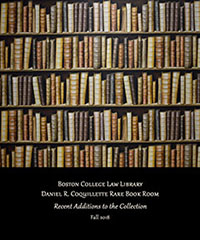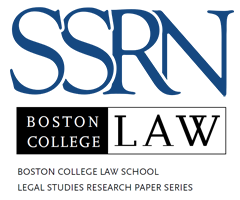
Professor and Associate Dean for Information and Technology Services, Law School
Dear friends and colleagues,
Welcome back to the start of another exciting academic year here at BC Law. There is always a feeling of exhilaration and renewal at the start of the new semester. This newsletter highlights several important services to support your teaching and scholarship, including information about two workshops on Westlaw’s Drafting Assistant and Lexis’s Microsoft Office for Word, software designed to aid you in your scholarship and publication activities, and about a new Law Library policy intended to make SSRN posting easier.
Please contact the Law Library with any questions that you may have about our services. We are always happy to hear from you, and we look forward to working with you this fall.
Cheers to the success of the 2018-2019 academic year!
Peace,

Filippa Marullo Anzalone
Professor of Law
Associate Dean for Library & Technology Services

Rare Book Room-Fall Exhibit
We have a new exhibit on display in the Rare Book Room for the fall semester featuring additions to the collection over the past three years or so. From heavily annotated books to law library catalogs to a writ filed by James Otis Sr. to collect his legal fees, our special collections are growing in interesting ways.
One of the most fascinating additions, a gift mediated by Dan Coquillette, is a 1796 statement of account between a Sturbridge blacksmith and another individual in which a debit is listed for "one black man," against a credit for a sorrel horse. It would provide a unique lens through which a student could examine the legal status of people of color in the Commonwealth, even after the effective legal abolition of slavery in Massachusetts.
Take a look at the exhibit webpage for some highlights. Please come visit in person when you get a chance, and encourage your students to do the same!

Faculty Workshops—Scholarship and Publication
The Law Library has partnered with Westlaw and LexisAdvance to offer workshops in software designed to support faculty scholarship and publication activities. We have sponsored 2 workshops with Mark Frongillo, our campus Westlaw representative, on the use of Westlaw’s Drafting Assisatnt tool to format law reviews and briefs. Our Lexis representative, Becky Erlichman, has offered 2 workshops on Lexis Microsoft Office for Word. This is an add-on to your Word toolbar to aid in checking your citations and creating tables of authorities, etc. If you were unable to attend, please contact Mark or Becky to set up an appointment for training.

New York Times, Wall Street Journal, Financial Times
BC Law Library provides personal digital subscriptions to the NEW YORK TIMES for students, faculty, and staff of the Law School.
Everyone in the BC Law School community received a “Welcome” email from the NEW YORK TIMES in September with instructions on how to sign up for a personal digital subscription as part of BC Law Library’s group account. PLEASE NOTE: if you have signed up for this in the past, you can IGNORE this email invitation from the Times. Your account is still active and your access should continue uninterrupted.
For those of you who are new to BC Law and would like to sign up for a free account, just follow the instructions in the “Welcome” email. (IMPORTANT: your email address must be in firstname.lastname@bc.edu format.) You will get an email back from the Times prompting you to create a password. It’s as simple as that!
If you do not receive this Welcome email from the Times—whether you’re new to BC Law this fall or have been around for a while—and you want to set up a subscription, let me know. I can help with that.
ALSO: The University Libraries offer similar digital access to both the WALL STREET JOURNAL and the FINANCIAL TIMES. You can set up and access your personal accounts for these publications by following the links below:
• Financial Times
• Wall Street Journal
You can also access these publications from the Law Library’s homepage. Click on “All Law Library Databases”, and then search for either or both titles.
Any questions—or any problems with your digital subscriptions at any time—please let me know! Deena Frazier, Collection Services Librarian.

Making SSRN Posting Easier
Faculty now have the option of instructing Law Library staff to post their new articles to SSRN as soon as we know they have been published. To opt in to this service, go to https://goo.gl/forms/YqEBBAlt3NQ5S9TC2.
Whether you choose to opt in or not, Law Library staff are always happy to post faculty scholarship to SSRN - just email Nick Szydlowski.

Ethical Use of Scanners and Copyright Concerns
Faculty: The Law Library staff sent the following letter to all students on September 11, 2018.
We have observed that some students are scanning books, casebooks, and other course reserve materials in their entirety. BC Law School students are held to ethical standards set out in the BC Law Student Handbook. These standards are designed to instill ethical and responsible behavior. Theft of copyrighted content by scanning an entire text is a violation of both U.S. Copyright law and the BC Law Student Handbook. Moreover, as law students, you are in training to enter the legal profession, a profession that is self-regulated by a code of ethics. Legal ethical standards are strictly upheld and enforced. We therefore ask you to consider whether your use of scanning equipment conforms to such standards.
The Law Library provides 3 KIC scanners for users. Scanners make copying easy and free—and also make it easy to violate U.S. copyright law and the BC Law Student Handbook. In general, when scanning copyrighted material, you may scan only as much as is allowed under fair use exceptions to Title 17 of the U.S. Code. Figuring out what that means can get complicated, but here are some tips to help keep you on the right side of the law as you pursue your legal education:
Most likely legal
• Scanning a chapter or short section of any book for your personal, educational use
• Scanning today’s reading from course reserves because you forgot your copy of the book
• Scanning your own copy of a book because you would rather read it on your computer and the publisher does not sell an electronic version
Most likely not legal
• Scanning an entire book, either all at once or over the course of a semester
• Using the scanner and course reserves to avoid buying the textbook
• Sharing scans that you have made with other students
Remember... U.S. copyright law (Title 17, U.S. Code) governs the making of reproductions of copyrighted material. The person using the Law Library’s scanning equipment is responsible for any infringement. Also, excessive scanning creates long lines at the scanners, stresses the scanning equipment, and imperils the Law Library’s capacity to provide this service to you, our valued users. Lastly, if your class allows an open book exam, you will need your own textbook to use during the exam.
Thank you for reading this. With all good wishes for your success and a thriving law school career,
The Law Library Staff
